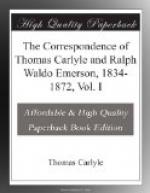—R.W. Emerson
XLI. Emerson to Carlyle*
Concord, 15 May, 1839.
My Dear Friend,—Last Saturday, 11th instant, I had your two letters of 13th and 17th April. Before now, you must have one or two notes of mine touching the stereotype plates: a proposition superseded by your new plan. I have also despatched one or two sheets lately containing accounts. Now for the new matter. I was in Boston yesterday, and saw Brown, the bookseller. He accedes gladly, to the project of five hundred American copies of the History. He says, that the duty is the same on books in sheets and books in boards; and desires, therefore, that the books may come out bound. You bind yours in cloth? Put up his in the same style as those for your market, only a little more strongly than is the custom with London books, as it will only cost a little more. He would be glad also to have his name added in the titlepage (London: Published by J. Fraser; and Boston: by C.C. Little and James Brown, 112 Washington St.), or is not this the right way? He only said he should like to have his name added. He threatens to charge me 20 percent commission. If, as he computes from your hint of 2/7, the work costs you, say, 70 cents per copy, unbound; he reckons it at a dollar, when bound; then 75 cents duty in Boston, $1.75. He thinks we cannot set a higher price on it than $3.50, because we sold our former edition for $2.50. On that price, his commissions would be 70 cents; and $1.05 per copy will to you. If when we see the book, we venture to put a higher price on it, your remainder shall be more. I confess, when I set this forth on paper, it looks as bad as your English trade,—this barefaced 20 percent; but their plea is, We guarantee the sales; we advertise; we pay you when it is sold, though we give our customers six months’ credit. I have made no final bargain with the man, and perhaps before the books arrive I shall be better advised, and may get better terms from him. Meantime, give me the best advice you can; and despatch the books with all speed, and if you send six hundred, I think, we will sell them.




